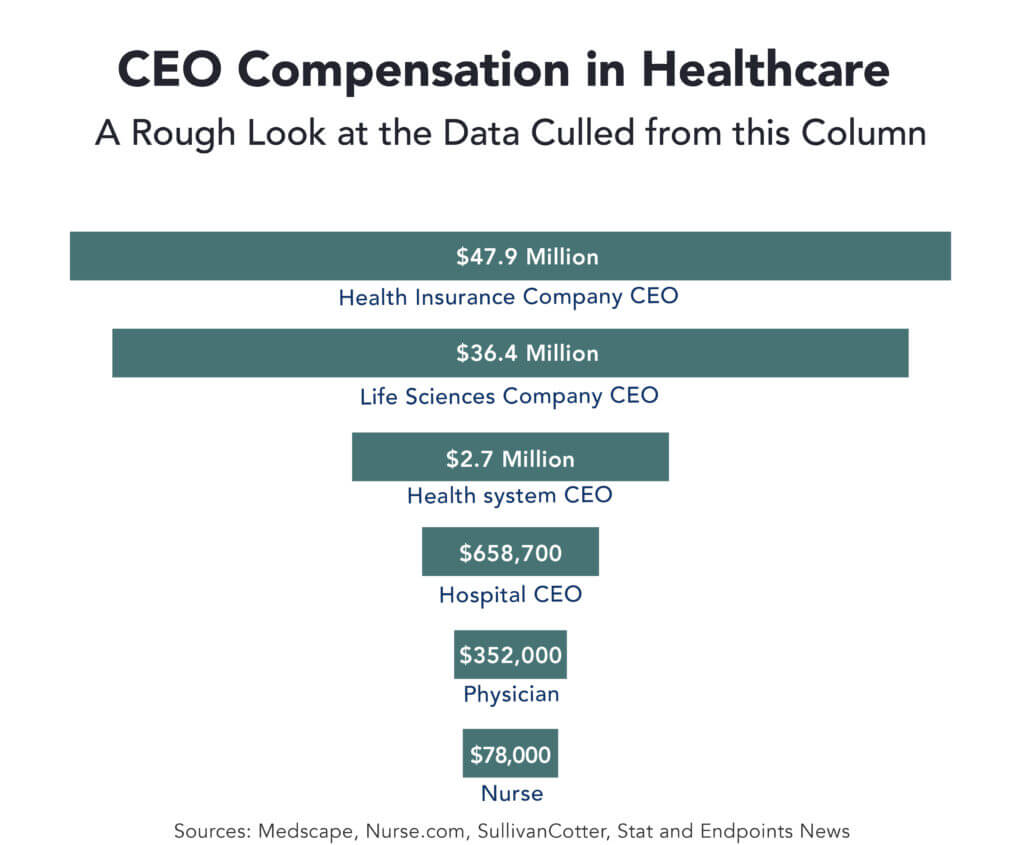June 6, 2023

Burda on Healthcare: Cry Poor and Prosper
If Compensation Is a Sign of an Industry’s Health, Healthcare Is Immortal.
When I was a cub healthcare business reporter and new to the beat, healthcare trade association after trade association tried to groom me into believing that the healthcare industry — and their sector of the industry, specifically — were on the brink of financial collapse. The hospitals, doctors, nurses, insurance companies and drug companies all needed (and deserved!) more money from the federal government and from each other to survive.
All the associations wanted me to be sympathetic to their cause, i.e., support the economic agenda of their members, and they wanted me to reflect that sympathy in my reporting.
So, I decided to ask a new economist source of mine at the time about signs that an industry really is in trouble. Ready to fail at any moment. In desperate need of a bailout. Truly on the edge of falling apart. He rattled off a list of warning signs. Near the top of that list was compensation. He said if everyone was still getting paid and getting paid more than before, things really weren’t that bad no matter how much an industry cried poor.
That struck a chord with me then that still vibrates to this day. The cheapest people I know, then and now, have the most money. The people I know who cry poor, then and now, pull up to my house in a high-end car, hang an expensive coat over my kitchen chair and tell me about their latest trip to Italy as I pour them a glass of low-end wine from a bottle I keep under the kitchen sink.
With my bias and the economist’s list in mind, I decided to look at a few recent compensation reports to see how the healthcare industry is doing. Here’s some of what I found.
Neurosurgeons Are the Highest-Paid Doctors
In March, Doximity released its latest annual physician compensation report. The report is based on a survey of more than 31,000 doctors in 40 specialties. The report said the average annual compensation of all physicians dipped 2.4% in 2022 compared with 2021, but the report didn’t give a dollar figure for either year. The report did rank specialties by compensation. The three highest-paid specialties in terms of average annual compensation were: neurosurgeons ($788,313); thoracic surgeons ($706,775); and orthopedic surgeons ($624,043). The three lowest-paid were: pediatric rheumatologists ($226,186); pediatric infectious disease specialists ($221,126); and pediatric endocrinologists ($218,266).
Physician Compensation Rose Nearly 4% This Year to $352,000
In April, Medscape released its latest annual physician compensation report. The report is based on a survey of more than 10,000 doctors in 30 medical specialties. For all physicians, their average annual compensation rose 3.8% to $352,000 this year from $339,000 last year. Compensation for primary care physicians (PCPs) rose 1.9% to $265,000, and compensation for specialists rose 3.8% to $382,000. Seventy-three percent of the respondents said they would choose medicine again as a profession, the same percentage as in Medscape’s 2022 survey.
PCP and APP Pay Hikes Eclipsed Specialist Pay Hikes in 2022
In May, the Medical Group Management Association released its latest annual DataDive Provider Compensation Report. The report is based on compensation data from nearly 190,000 physicians and advanced practice providers working at more than 6,800 medical practices. A summary report based on the full report said the total median compensation of PCPs, surgical specialists, nonsurgical specialists and APPs rose 4.4%, 2.5%, 2.4% and 3.7%, respectively, in 2022 compared with 2021. The summary report didn’t give actual dollar figures other than a scale on the Y axis on a rudimentary bar chart. I could use a ruler to give you a guess, but who needs to run a correction.
Most Registered Nurses Got Raises Last Year
In January, American Nurse published by the American Nurses Association released its latest annual Nursing Trends and Salary Survey. The report is based on a survey of nearly 4,400 nurses. Forty-six percent of the nurse respondents said their annual salaries fell between $80,000 and $139,999 last year, up from 39% in 2021. Fifty-four percent said they got a raise in 2022. Forty-eight percent of nurse managers said they got a discretionary bonus last year. For the sixth straight year, according to the report, 82% of the nurse respondents said they would choose nursing as a profession again.
Salaries Climb for Advanced Practice RNs
In May, Nurse.com release its latest biennial Nurse Salary Research Report. The report is based on a survey of 2,516 nurses. According to the report, the median salary for a registered nurse rose 6.8% to $78,000 in 2022 from $73,000 in 2020. It rose 12.1% to $120,000 for advanced practice RNs over the same period. Sixty-three percent of the nurse respondents said their employer offered them tuition reimbursement in 2022 with the average reimbursement amount being $5,795 last year.
Double-Digit Comp Increases for Hospital and Health System Execs
Last August, Modern Healthcare published its annual Management and Executive Compensation Survey based on data from SullivanCotter, the management consulting firm. It’s a topic close to my heart because back when I was at Modern Healthcare, where I was editor for 11 years, I made the deal that led to Modern Healthcare using SullivanCotter’s data for the annual survey.
According to the latest survey, the median total cash compensation of presidents and CEOs of health systems with $3 billion or more in annual net revenue rose 17.1% in 2022 to about $2.7 million from $2.3 million in 2021. Presidents and CEOs of large hospitals did even better percentage-wise. Their median total cash compensation jumped 21.7% to $658,700 last year from $541,000 in 2021. This year’s survey results are due in August.

Top Health Insurance Executives Say ‘Hold My Beer’
In April, Bob Herman at Stat, who is the best healthcare business reporter in the game right now, published this piece on health insurance company executive compensation in 2022. According to Herman’s analysis of company annual financial disclosure reports, the combined total compensation of CEOs of seven of the largest publicly traded health insurance companies was more than $335 million last year. That’s an 18% jump from 2021 for the same top execs. Increases in prices for the companies’ stock powered the big increase, according to the story.
Top Pharma Company Executives Say ‘Hold My Champagne’
In May, Endpoints News released its analysis of the highest-paid executives in the pharma, biotech and life sciences segments of the industry. Endpoints said the 20 highest-paid execs made a combined $725 million last year, or an average of $36.4 million each. The execs’ pay packages included salary, bonuses, stock awards, stock options and other forms of compensation. Hats off to Andrew Dunn, Endpoints’ biopharma reporter, for pulling this together. He probably needed two calculators to do this story.
If my economist source whom I referenced earlier in this column is correct, and that compensation and change in compensation are strong indicators of the life or death of an industry, then I’d say healthcare as an industry is pretty healthy. Maybe even immortal.
That also explains why no one in control wants to change it despite claims to the contrary. Everyone is making too much money off the status quo.
The only people not making money off the status quo are the industry’s customers. Consumers, patients and members are going bankrupt as they empty their pockets and bank accounts to feed the healthcare industrial complex’s insatiable appetite for higher profits and higher salaries.
It’s always the ones who cry poor who have the most money.
Thanks for reading.





